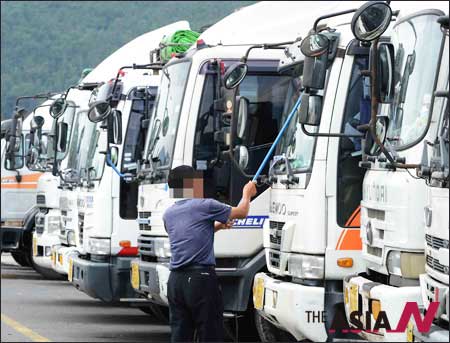2,000 truckers go on strike

A driver cleans the windshield of a truck parked alongside others at a public parking lot in Changwon, South Gyeongsang Province, Monday. Some 2,000 unionized drivers went on strike, raising fears of a possible disruption in the country’s cargo transportation system. / Korea Times photo by Lee Ho-jae
Some 2,000 unionized truck drivers went on strike Monday, raising fears that the country’s cargo transportation will suffer serious disruption if prolonged.
No major disruptions were reported at major ports, but the Korean Cargo Transport Workers’ Union has threatened to block traffic coming in and out of them. The government vowed to take stern measures against any illegal activities by unionists.
The Ministry of Land, Transport and Maritime Affairs formed a task force to prevent possible disruptions of transportation. The ministry said that 97.3 percent of trucks were in operation throughout the nation on the first day of the workout.
Cargo container trailer traffic in the Port of Busan, the country’s largest, and other major ports ran smoothly, but some inland container depots were, to some extent, adversely affected by the strike.
Adding to concerns, unionized workers from construction businesses are scheduled to begin an indefinite strike Wednesday.
There are 21,400 container trailer trucks across the country, around 4,000 of which are run by unionized workers. About half of the unionized drivers joined the strike.
The union is calling for an average fare increase of 30 percent along with a tax cut on their gas purchases. Also included are demands to improve the subcontract system for truckers, which it alleges benefits only large logistics companies. It vowed to continue the strike until all its demands are met, saying that its members will step up their struggle.
A regional leader of the union has launched a sit-in atop the cargo traffic control tower at the inland container depot in Uiwang, south of Seoul, and another on a highlight tower in Busan.
Hundreds of police officers were dispatched to major ports and ramps leading to expressways to prevent striking truckers from blocking key transportation routes. The ministry said it plans to mobilize military trucks and increase the number of cargo trains running between ports in Busan and Incheon to minimize effects of the strike.
This is the third time that the truckers’ union has launched a strike under Lee Myung-bak’s administration. During a strike in 2008, the country suffered a total of $5.6 billion in financial losses, according to the ministry.
“We saw no major disruptions at the Busan Port, but some striking truckers scuffled with non-unionist drivers to block the latter from running trucks,” said an official from the Busan Regional Maritime Affairs and Port Office. “We plan to mobilize military vehicles and more cargo rail services to prevent a possible delay in shipments during the strike.”
The union criticizes the government for making little effort to improve what it describes as the unfair sub-contract system. Truckers are contracted to pay commissions to brokers that connect the drivers with major companies for cargo transport.
Aside from soaring diesel prices, truck drivers are feeling the pinch from charges they have to pay in order to win cargo orders, with commissions estimated at up to 40 percent of their freight rates.
“The government promised earlier to enhance the system to guarantee better payment for drivers, but it has not done so,” said Park Won-ho, head of the Busan branch of the truckers’ union. “We decided to take action because the unfair system is threatening our livelihood.” <The Korea Times/Na Jeong-ju>

























































